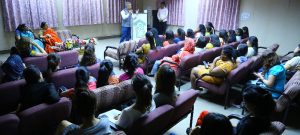Living in COVID times: from the diary of a social work faculty
Pamela Singla
It’s nearing two months since life has taken a different turn – filled with lockdown announcements; newer forms of vulnerability; new vocabulary through coloured zones, social and physical distancing and the latest webinars. Social work is a differently profiled profession and the unique feature of social workers requires them to reach out to the society. But Covid-19 has led to physical confinement which has become a disadvantage for the profession. Most social workers are working from home, particularly those in academia. In this paper I reflect upon my role as a social work professional confined to family, students and the hostel.
Family-centric
Starting from home front, three of us – me, my husband and our daughter, are enjoying being together. The responsibilities were divided from the first day of lockdown: the chores ranging from washing dishes, mopping, cutting and cooking and going out for emergency purchases. Tempers were kept under control and freedom of access to equal space appreciated. ‘Minimise conflict’ was the mantra adopted by the three of us while attending to household chores. We have sailed well together in the past two months and emerged strong.
Student-Centric
Faculty initaited and maintained student interactions online. The students had returned to their respective home towns and a few were under quarantine as they had crossed state borders. Field work supervisees were guided on their online weekly field assignments. Delhi University’s Department of Social Work holds fieldwork sessions twice weekly. Assignments were undertaken through social media. E elective and core paper classes, reading materials were online with Google group, a challenge given my limited online skills.
The students appreciated having academic interactions, given the passage of time. This offereda change from their new lockdown routine. Challenges that students faced included lacking a laptop or internet connections. Additionally, one remained in quarantine. The class schedule was adjusted to suit everyone’s convenience. During the online class hours, students’ attendance was checked by calling out their names. This ensure that they were present and learning, initiating a new kind of ethics.
Hostel-centric
As the hostel Provost, I could identify my roles as those of a facilitator, counsellor, and guardian of the foreign residents for whom the hostel is the world. Weekly visits were made to personally meet and address their anxieties around examination, lockdown, boredom, confinement. The girls have emerged strong and have developed better and more harmonious relations with each other.
Conclusion
Covid-19 has changed our lifestyles, our professional work and introduced new ethics to our profession. The new mantra is ‘stay safe stay online’. The pandemic has made us realise that we can live together and live in harmony.
Key words: social work, academician, lockdown, Covid-19, students, family
About the author
Pamela Singla is Professor of Social Work at Department of Social Work, University of Delhi (DU), India. She also holds the position as Provost of the International Students House for Women in the same University. Email: pamelasingla@gmail.com
Picture from the seminar organized in hostel in 2019







